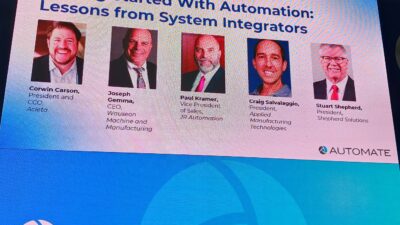An automated radio frequency identification (RFID)-based control system has enabled Auto 5000 GmbH, a subsidiary of the Volkswagen Group, to achieve significant throughput timesavings and reductions of defect rates for the "threaded assemblies" process step during body assembly of the VW Touran (similar to the Touareg).
An automated radio frequency identification (RFID)-based control system has enabled Auto 5000 GmbH, a subsidiary of the Volkswagen Group, to achieve significant throughput timesavings and reductions of defect rates for the “threaded assemblies” process step during body assembly of the VW Touran (similar to the Touareg). Schreiner LogiData—provider of barcode and RFID and automated track and trace technologies for production control systems and logistics—supplied the system and did the integration.
Deployment of 13.56-MHz RFID process-control allows Auto 5000 to mark each Touran body with its own identification number. This code enables automatic queries of the related production specifications from a database and precise execution of the assembly steps by mobile, semi-automatic work cells.
The implementation eliminates need for assembly workers to manually enter machine settings. The technology allows threaded assembly process steps to be precisely synchronized with process cycles and electronically documented. Results include acceleration of the “threaded assembly process” and reduction in defect rates.
At the beginning of the production process, the Touran bodies-in-white are marked with a bar-code label containing a vehicle-specific number. The code is stored in a database along with vehicle-specific production parameters. These include torque levels to be applied to fasteners. During the “threaded assemblies” process step, a read-write unit transfers the barcode identification number to four RFID labels integrated into each segment of the rotating scale belt.
60 work cells
The auto body resting on the belt can thus be clearly and easily identified by the data carriers located in the respective segment of the belt. Each of the 60 semi-automated mobile work cells can read the vehicle-specific identification number to query and execute the specified production parameters. At the end of the assembly line, the data are deleted from the RFID labels to prepare them for reprogramming to support the next assembly process on the rotating belt.
Schreiner LogiData, the general contractor and system integrator, managed the project, did concept and design, selected system components, (RFID labels, readers and antennas,) installed hardware, and integrated software into the manufacturing information system used by the Volkswagen subsidiary. RFID enables pinpoint production control, improved traceability and documentation, and minimized human errors, Schreiner LogiData says.
www.schreiner-logidata.de



